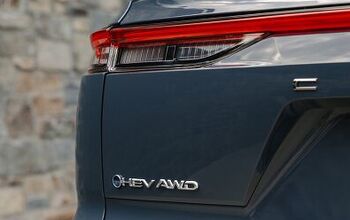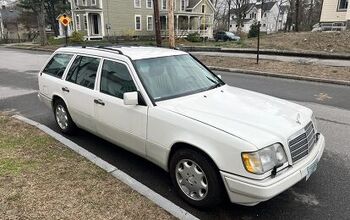Ford And Taxpayers Giving Away 4,600 EV Home Chargers, Nissan Not So Much
Worried about the high MSRPs on most of the electric vehicles scheduled for launch over the next year? Don’t forget to include the cost of buying and installing a home charging station. Nissan reckons the charger for its Leaf will cost about $2,200, including a home electrical inspection [er, that’s a medical marijuana grow…] and installation. Oh, and it won’t be Nissan coming into your home: Aerovironment, a firm otherwise best known for its Unmanned Aerial Vehicles, has the contract to supply and install the Leaf’s charger. Coulomb Technologies supplies the home charger for Ford’s first EV, the Transit Connect EV, and according to Automotive News [sub], they’re partnering with Ford to give chargers away to the first 2,000 buyers of the electric-drive delivery van. But, as usual with good news in the EV sector, the charger giveaway is actually being funded by tax dollars…
The chargers are being given away as part of Coulomb’s ChargePoint program, which seeks to improve EV infrastructure in nine US regions. That means the free chargers are only available to customers in or around
Austin, Texas, Detroit, Los Angeles, New York, Orlando, Fla., Sacramento, Calif., the San Jose/San Francisco Bay Area, Redmond, Wash., and Washington DC
Which is kind of ironic considering the Alliance of Automotive Manufacturer’s (which Ford is a member of) recently lambasted a regionally-based infrastructure development bill, arguing that it
risks resulting in federal resources becoming overly concentrated in a small number of communities, which could establish electric cars as boutique vehicles… Electric cars and their infrastructure should be available to everyone nationwide, not just people in select communities.
Ah well. In any case, $15m of the ChargePoint program’s $37m budget is being paid for by a stimulus bill grant (via the Department of Energy’s Transportation Electrification Initiative), and Coulomb hopes to fund the rest of the program with money from local governments. In return for the free Ford/Coulomb publicity, free chargers for early adopters, and a free sense of green self-satisfaction, the ChargePoint program will conduct a two-year study of EV and charging network use for the government.
And though the fairness and efficacy of government subsidies for home-chargers is debatable, it’s not likely to let up anytime soon. There is currently a federal tax credit worth half the value of a home charger installation (up to $2,000) which is set to expire in December of this year. That will help Nissan and GM, which do not have access to a government-funded charger-giveaway program like Ford’s (although local governments like Los Angeles are also rolling out home-charger subsidies). Look for that credit to be renewed before the end of the year, as governments the world over have clearly signed on to the idea that EVs are worth being subsidized from every possible angle. And considering that costs for installation could, in some cases, reach all the way to $10,000, home chargers are going to need all the help they can get.
More by Edward Niedermeyer
Latest Car Reviews
Read moreLatest Product Reviews
Read moreRecent Comments
- EBFlex Honda all day long. Why? It's a Honda.
- Lou_BC My ex had issues with the turbo CRV not warming up in the winter.I'd lean to the normally aspirated RAV 4. In some cases asking people to chose is like asking a Muslim and Christian to pick their favourite religion.
- 3-On-The-Tree Agree turbo diesels are probably a different setup lower compression heat etc. I never towed with my rig and it was all 40 miles round trip to work with dealer synthetic oil 5,000mi changes. Don’t know the cause but it soured my opinion on turbo’s plus the added potential expense.
- DesertNative More 'Look at me! Look at me!' from Elon Musk. It's time to recognize that there's nothing to see here, folks and that this is just about pumping up the stock price. When there's a real product on the ground and available, then there will be something to which we can pay attention. Until then, ignore him.
- Bkojote Here's something you're bound to notice during ownership that won't come up in most reviews or test drives-Honda's Cruise Control system is terrible. Complete trash. While it has the ability to regulate speed if there's a car in front of you, if you're coasting down a long hill with nobody in front of you the car will keep gaining speed forcing you to hit the brakes (and disable cruise). It won't even use the CVT to engine brake, something every other manufacturer does. Toyota's system will downshift and maintain the set speed. The calibration on the ACC system Honda uses is also awful and clearly had minimum engineering effort.Here's another- those grille shutters get stuck the minute temperature drops below freezing meaning your engine goes into reduced power mode until you turn it off. The Rav4 may have them but I have yet to see this problem.

































Comments
Join the conversation
I'm one of the people who has made a deposit on the Leaf, and part of the signup process involves filling out a questionnaire about where the Leaf will be parked, where your electrical panel is relative to your garage, and so on -- and this questionnaire was kicked off after I was offered a chance to get a free charger + installation from eTec. Here's an article that mentions it: http://www.kitsapsun.com/news/2010/apr/23/kitsap-buyers-lining-up-for-electric-leafs/ Here's the link I followed to sign up: http://www.theevproject.com/ So note that Nissan (and the taxpayers, natch), in this fashion, is indeed offering free chargers for folks. According to the email I was sent on 4/28, they're going to let folks know by June 30th whether they qualify or not.
Detroit? No trip in Detroit metro area is short. Surprised Boston didn't make the cut.